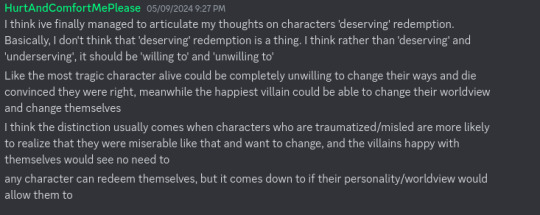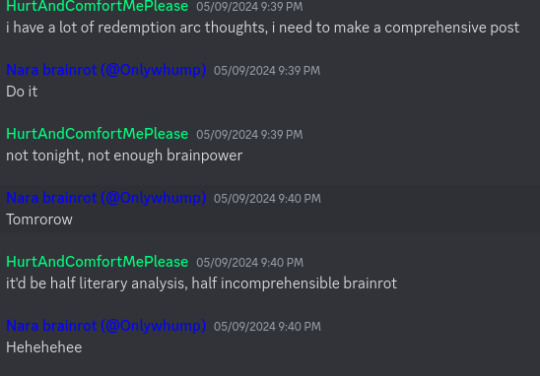#I accidentally deleted it when I was halfway through it and almost gave up altogether
Text
My Views on Redemption
A while ago in a discord I posted this:

and then, a few minutes later:

So, @onlywhump , this is for you.
So what do I, an amateur writer, have to say about redemption?
A lot. The answer is, A Lot.
Let's start off with an explanation of what a Redemption Arc even is, because a lot of people don't really seem to understand;
I consider there to be four Arcs; (In simplest terms)
Redemption Arc - A bad person becomes a good person.
Realignment Arc - A good person from a bad place moves to a good place.
Reclamation Arc - An external factor made a person bad against their will, but they become good once again of their own volition.
Atonement Arc - A bad person repents for their actions and accepts the consequences without reconciliation.
These Arcs can be combined, or can be distinct. The differences lie in the conduct of the character undergoing the arc.
I will say this now, and I will say this later, too, in order to need redemption, a character must have done something horrible in their past. If your character wasn't ever bad, then they don't need a redemption, they need either a realignment or reclamation Arc.
Secondly, Forgiveness =/= Redemption, however forgiveness is often part of redemption stories due to its signalling that both parties have grown and moved past their mutual past. Obviously forgiveness isn't something to be expected of a victim, however in fiction it is often seen as closure for all involved.
Thirdly, there is no such thing as 'deserving' redemption. Redemption is not something that is given, it is something that is done. Everybody deserves to be a good person, the only thing that matters is if a character is willing to do what it takes to become a good person.
Fourthly, a redemption arc is not punitive by definition. Redemption is an interpersonal journey that results in mutual positive growth and reconciliation. If the character is punished for their actions and that is the end of it, it is an atonement arc instead.
Now, let's move onto what I feel to be the building blocks of a good redemption story:
Number 1: Backstory and Characterization
I believe that the single most vital aspect of a redemption arc is the characterization of the character being redeemed. When deciding if a character should be redeemed or not, you must look at their personality and see whether or not they are the type of person who would be willing to subject themselves to the humiliation, upturning, and reconstruction that comes with true positive change and taking responsibility for their actions.
That is not to say that a character's personality and views cannot change, but where they start is just as important as where they end up. When writing a character, you must consider what could convince a person to change, and what it would take to make them completely alter their worldview. It is also important to consider how the character came to those ideas, and how deeply ingrained they are.
If a character is unwilling to accept that they were wrong, don't care if they were wrong, or hate the heroes enough, they may be completely unwilling to even consider redemption. This can be true no matter who holds these views.
At the same time, if a character is willing to understand their wrongdoings and weather the storm of growing and getting better, then they are the ones who would end up redeemed.
There is no one-size-fits-all path for redeeming characters, as the nature of redemption is highly personalized. A character who is prideful and vain will have a much different path than a character who is more introspective.
Another important factor to consider before committing is support. People need support in order to improve themselves, and whether or not a character has the support they need can alter their paths considerably. Does the character leave everyone they've ever known behind in order to redeem themselves? Do they have a relative/friend on the side of good who is willing to help them? What does the character think of this?
A character without the aid of others may be liable to relapse, become morally or ideologically lost, or fall down a different spiral. This is natural, and falling for something does not mean that a character is irredeemable.
Finally, let even your most horrible and heinous characters have distinct and likable qualities. Let them be funny, let them be creative, let them be passionate, that way when they redeem themselves, those traits can shine through even brighter.
Number 2: Guilty Beyond the Shadow of a Doubt
I said it earlier, and here I say it again; If a character hasn't done anything wrong, then they don't need to be redeemed. If a character was always a good person, just on the wrong side, then it's a realignment arc. Your character MUST have done something horrible in order to warrant redeeming themselves, otherwise it's unnecessary.
What exactly the character has done while they were a villain is up to the writer, but know that whatever they have done MUST be addressed, and the severity of the event in question will directly effect the lengths the character must go to in order to redeem themselves.
Questions to consider:
Was it personal? Did the character do something specifically to spite someone else? Why? Who was it?
What was their goal? Did they achieve it?
Was it planned, or spur of the moment? Was it in a fit of rage, or carefully calculated?
How did the character justify it to themselves when they committed it? Do they consider themselves to be in the right?
What are the long-term ramifications of their actions?
How do others view these actions? Both heroes and villains?
These may help inform a reference of what the character has done, and what effect they have had on the world around them. This world of their own creation will be the obstacle that the character navigates during their redemption.
Number 3: Turning Point
In any redemption story comes the point at which the character in question comes to realize that they need to make amends for what they have done. There are a million ways to do this, and all of them are highly specific to an individual character.
Bottom line, this is the point at which the biggest change will occur. It will not be as easy as flipping a switch, it may take a lot of back and forth for a character to come to the final decision to change their ways. A character may even double down on their actions for a time in order to pretend that they don't feel guilty about it. Depending on the mental state of the character, one could expect a lot of self-hatred and bitter regret.
At the end of this point, the character will have to make up their mind as to whether or not they want to continue down the path they currently walk, and if they decide not to, then that is the first step of redemption.
Number 4: Growing Pains
It will not be a smooth ride. Growth is uncomfortable, it is sometimes painful, as will be the circumstances.
If a character has to leave their entire life behind, there will be a brief rock-bottom phase. Maybe nothing works at first and the character is convinced they've ruined their own life for nothing, but persistence is key. Again, how the character reacts to their new surroundings is entirely up to the character themselves. There is no set path.
Relapses are also powerful, a character may temporarily slide back into their old ways and sabotage themselves if they are stuck in a rut they don't feel they can escape.
Learning to deal with new and upsetting emotions such as guilt, shame, and self-loathing is to be expected, the character may struggle hard against these feelings. I'd almost liken it to the 5 stages of grief, but instead it is the 5 stages of guilt or something.
Depending on the ego of the character, they may even slip into the trap of blinding envy, inane jealousy of others who live without crushing guilt, or who are beloved when they are hated. They might even become actively self-destructive if their emotions become too much to handle, or they don't have the support necessary to properly express or process it.
But, that is not to say that it is only pain all the time, rather it is a rollercoaster of highs and lows. They might help save the day and be accepted by new people, and then they might make a selfish decision and cause a rift between them and the heroes. Really, as I have stated multiple times now, it depends on a number of factors.
This is the part when both a character's flaws and strengths are at their most potent, and using the strengths to work through the flaws is the goal. The flaws are not there to be undermined or defeated, they are there to be worked through and put to rest.
Number 5: Relationships and Forgiveness
To preface, I am aromantic/asexual, I am by no means a person to talk about romantic relationships, so I will keep talk of that to a minimum.
Relationships, old and new, are very important to redemption stories. Letting go of relationships and forming new ones, or reconciling and regrowing a relationship are beyond vital to positive growth. People need support, and with it they can open up and find a better way.
Ex-villains should be allowed to love and be loved should they find people willing to do so with them, relationships aren't exactly something to be deserved. Once a character becomes more likable, people will start to like them.
I say this now, as redemption and relationships/forgiveness can be a controversial discussion, that villains in stories are more often that not metaphors for real life happenings, and aren't meant to be taken at face value. Let it be known beyond the shadow of a doubt that what I am saying in this entire spiel is about fictional characters.
Forgiveness is not something that will be quick. Again, I say for the umpteenth time, it depends on the characters involved. Listen to your characters, what they want, if and how much they care about each other, and whether or not the character is the type of person to forgive at all.
Generally speaking, in redemption arcs in media, especially in media aimed at children, are often more simplified, and characters very frequently become friends with old enemies. This is typically because those shows are meant to be educational, and kids should be encouraged to apologize, make amends, and forgive each other. There is no problem with this.
Whether or not a character should be forgiven isn't exactly something I can explain here, it should depend on the themes of the story, the other characters and their arcs, and countless other factors. Forgiveness signals closure, and that closure may come in phases, don't feel pressured to rush it, let it come from the characters naturally.
TL;DR, Character is fate.
#story tropes#whumpblr#emotional whump#whump writing#whump community#redemption arc#writing tropes#tropes#character tropes#book tropes#holy shit this took me like 3 days to write#I accidentally deleted it when I was halfway through it and almost gave up altogether
22 notes
·
View notes